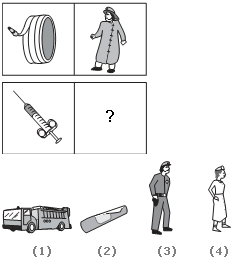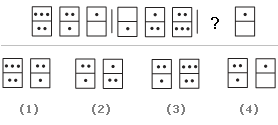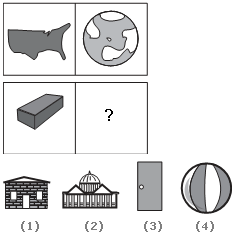Discussion
Home ‣ Logical Reasoning ‣ Logical Deduction See What Others Are Saying!
- Question
Statements: All roads are poles. No pole is a house.
Conclusions:
- Some roads are houses.
- Some houses are poles.
Options- A. Only conclusion I follows
- B. Only conclusion II follows
- C. Either I or II follows
- D. Neither I nor II follows
- E. Both I and II follow
- Correct Answer
- Neither I nor II follows
ExplanationSince both the premises are universal and one premise is negative, the conclusion must be universal negative. So, neither I nor II follows. - 1. orchestra
Options- A. violin
- B. stage
- C. musician
- D. soloist Discuss
- 2. bonus
Options- A. reward
- B. raise
- C. cash
- D. employer Discuss
- 3. Choose the picture that would go in the empty box so that the two bottom pictures are related in the same way as the top two:

Options- A. 1
- B. 2
- C. 3
- D. 4 Discuss
- 4. Look carefully at the sequence of symbols to find the pattern. Select correct pattern:

Options- A. 1
- B. 2
- C. 3
- D. 4 Discuss
- 5. Look carefully at the sequence of symbols to find the pattern. Select correct pattern:

Options- A. 1
- B. 2
- C. 3
- D. 4 Discuss
- 6. Look carefully at the sequence of symbols to find the pattern. Select correct pattern:

Options- A. 1
- B. 2
- C. 3
- D. 4 Discuss
- 7. Choose the picture that would go in the empty box so that the two bottom pictures are related in the same way as the top two:

Options- A. 1
- B. 2
- C. 3
- D. 4 Discuss
- 8. Statements: "The Government will review the present policy of the diesel price in view of further spurt in the international oil prices". - A spokesman of the Government.
Conclusions:
- The Government will increase the price of the diesel after the imminent spurt in the international oil prices.
- The Government will not increase the price of the diesel even after the imminent spurt in the international oil prices.
Options- A. Only conclusion I follows
- B. Only conclusion II follows
- C. Either I or II follows
- D. Neither I nor II follows
- E. Both I and II follow Discuss
- 9. Statement: An advertisement in a newspaper - "Wanted unmarried, presentable, matriculate girls between 18 and 21, able to speak fluently in English to be taken as models."
Assumptions:
- Fluency in English is a pre-requisite for good performance as a model.
- Height does not matter in performing as a model.
Options- A. Only assumption I is implicit
- B. Only assumption II is implicit
- C. Either I or II is implicit
- D. Neither I nor II is implicit
- E. Both I and II are implicit Discuss
- 10. Statement: A line in an advertisement in a newspaper - "You really get your money's worth when you buy from our shop."
Assumptions:
- Other shops price goods above their worth.
- People want full value for their money.
Options- A. Only assumption I is implicit
- B. Only assumption II is implicit
- C. Either I or II is implicit
- D. Neither I nor II is implicit
- E. Both I and II are implicit Discuss
More questions
Correct Answer: musician
Explanation:
An orchestra is a large group of musicians, so musicians are essential. Although many orchestras have violin sections, violins aren't essential to an orchestra (choice a). Neither a stage (choice b) nor a soloist (choice d) is necessary.
Correct Answer: reward
Explanation:
A bonus is something given or paid beyond what is usual or expected, so reward is the essential element. A bonus may not involve a raise in pay or cash (choices b and c), and it may be received from someone other than an employer (choice d).
Correct Answer: 4
Explanation:
Hose is to firefighter as needle is to nurse. This relationship shows the tools of the trade. A hose is a tool used by a firefighter; a needle is a tool used by a nurse.
Correct Answer: 1
Explanation:
Look carefully at the number of dots in each domino. The first segment goes from five to three to one. The second segment goes from one to three to five. The third segment repeats the first segment.
Correct Answer: 1
Explanation:
In this series, the figures increase the amount of shading by one-fourth and, once a square is completely shaded, starts over with an unshaded square. In the second segment, you will notice that the figure goes from completely shaded to completely unshaded. This is why choice a is the correct choice.
Correct Answer: 2
Explanation:
Each arrow in this continuing series moves a few degrees in a clockwise direction. Think of these arrows as the big hand on a clock. The first arrow is at noon. The last arrow before the blank would be 12:40. Choice b, the correct answer, is at 12:45.
Correct Answer: 1
Explanation:
The United States is to the world as a brick is to a brick house. This relationship shows part to whole. The United States is one part of the world; the brick is one part of the house.
Correct Answer: Either I or II follows
Explanation:
The Government seeks to review the policy so as to determine whether the diesel price needs to be increased or it can be kept stable by adjusting certain other factors. So, either decision may be taken. Thus, either I or II follows.
Correct Answer: Only assumption I is implicit
Explanation:
'Fluency in English' is a condition mentioned for girls to be taken as models. So, I is implicit. Since nothing is mentioned about the height, so II is not implicit.
Correct Answer: Only assumption II is implicit
Explanation:
Clearly, the advertisement mentions nothing about the prices of goods in the various shops. So, I is not implicit. The advertisement is given keeping in mind the desire of the people to get full value of their money. So, II is implicit.
Comments
There are no comments.More in Logical Reasoning:
Programming
Copyright ©CuriousTab. All rights reserved.
